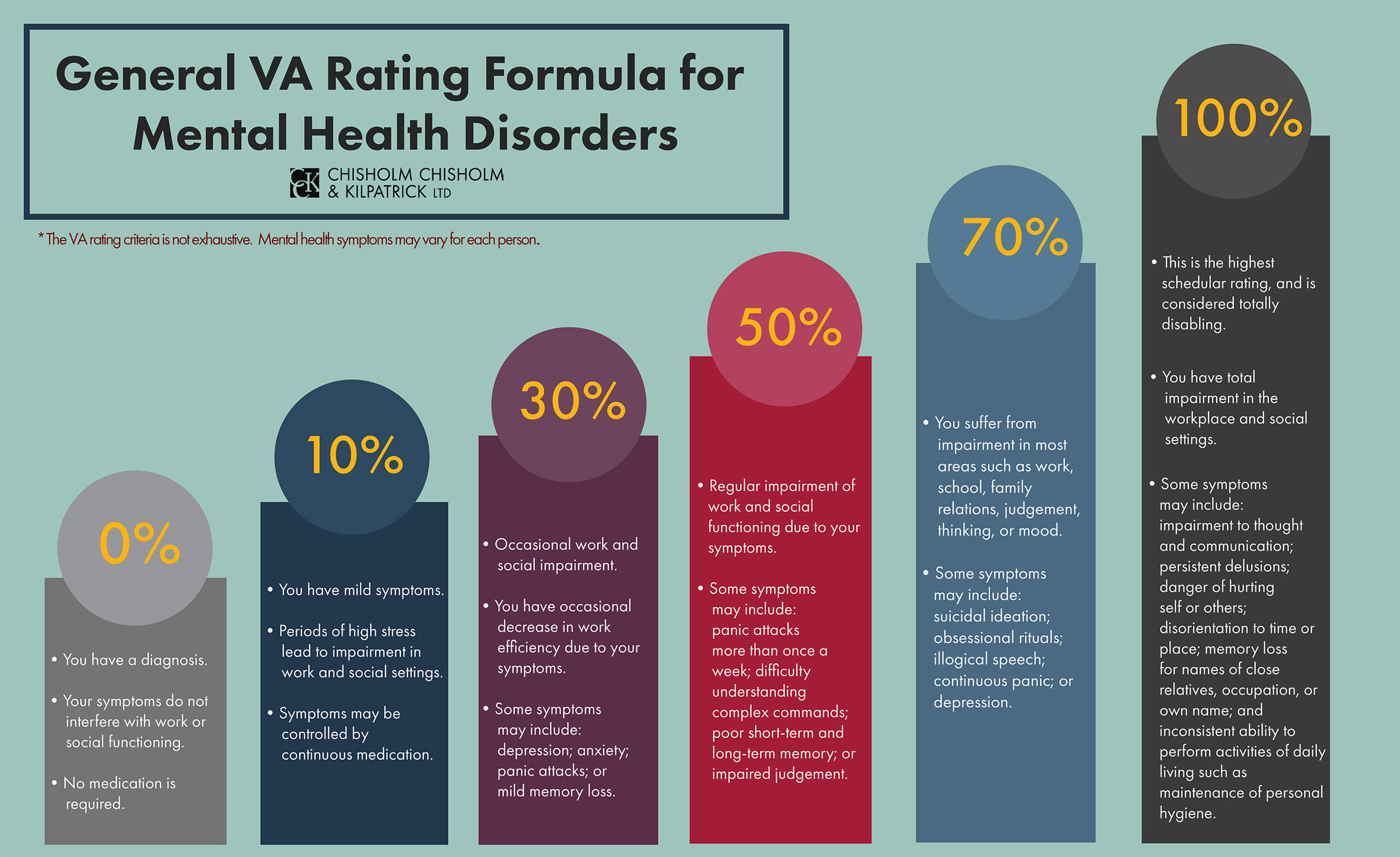Compensation and Pension (C&P) Exams for Depression

CCK Law: Our Vital Role in Veterans Law
Overview of Depression
Depression is a serious mental health condition that affects the way a person thinks, feels, and acts. Symptoms of depression tend to vary amongst individuals; however, common symptoms include the following (see full list of symptoms in “Diagnosing Depression During a C&P Exam” section):
- Persistent feelings of sadness, worthlessness, and hopelessness
- Lack of motivation or interest in activities that usually derive pleasure
- Difficulty sleeping and concentrating
- Change in appetite resulting in weight loss or weight gain
- Irritability
- Decreased energy/fatigue
- Thoughts of death or suicide, or suicide attempts
- Aches or pains, headaches, cramps, or digestive problems without a clear physical cause and/or that do not ease even with treatment
Some forms of depression are slightly different, or they may develop under unique circumstances, such as:
- Persistent depressive disorder (dysthymia). Depressed mood that lasts for at least two years; marked by episodes of major depression along with periods of less severe symptoms.
- Seasonal affective disorder. Characterized by the onset of depression during the winter months, where there is less natural sunlight. This depression generally lifts during spring and summer.
- Bipolar disorder. Someone with bipolar disorder experiences episodes of extremely low moods that meet criteria for major depression; however, a person with bipolar disorder also experiences extreme high (euphoric) moods called “mania”.
Importantly, if you or someone you know is experiencing symptoms of depression that result in suicidality, call the Veterans Crisis Line at 1-800-273-8255.
What Are Compensation and Pension Examinations?
Compensation and Pension (C&P) exams are medical exams ordered by the Department of Veterans Affairs to evaluate the conditions that a veteran is claiming for disability compensation. These exams are meant to assess the etiology and/or severity of a veteran’s condition and are part of VA’s duty to assist veterans in obtaining evidence to support their disability claims. Either a VA medical professional or a third-party medical professional contracted by VA will conduct the exam. Before a C&P exam for depression, the examiner should review the veteran’s entire claims file and look for any evidence that may be related to the condition.
How Does VA Evaluate Depression During the C&P Exam?
During a C&P exam for depression, the medical examiner will ask the veteran questions about how the veteran’s feelings of depression affect them on a daily basis. Oftentimes, the medical examiner will complete a Disability Benefits Questionnaire (DBQ), which uses checkboxes and standardized language so that the disability evaluation can be made quickly and correctly. Specifically, healthcare providers will “check a box” next to a description that most accurately depicts the disability in question – in this case, depression.
Diagnosing Depression During a C&P Exam
Generally speaking, VA uses criteria from the Diagnostic and Statistical Manual of Mental Disorders, Fifth Edition (DSM-5) to evaluate whether there is a valid diagnosis of depression. The DSM-5 criteria for major depressive disorder, the most common type of depressive disorder, involves the following:
- Five (or more) of the following symptoms must be present during the same 2-week period and represent a change from previous functioning; at least one of the symptoms is either (1) depressed mood or (2) loss of interest or pleasure.
- Depressed mood most of the day, nearly every day
- Anhedonia (i.e., loss of pleasure), nearly every day
- Significant weight loss, or decrease in appetite nearly every day
- Insomnia or hypersomnia nearly every day
- Psychomotor agitation or retardation nearly every day
- Feelings of loss of energy nearly every day
- Feelings of worthlessness or excessiveness nearly every day
- Diminished ability to think or concentrate nearly every day
- Recurrent thoughts of death, recurrent suicidal ideation without a specific plan, or a suicide attempt or a specific plan for committing suicide
- The symptoms cause clinically significant distress or impairment in social, occupational, or other important areas of functioning.
- The depression is not attributable to the physiological effects of a substance or to another medical condition.
Assuming a veteran meets all of the criteria from the DSM-5 necessary for a diagnosis of depression, the symptoms section of the DBQ will then help determine the appropriate disability rating.
Furthermore, the DBQ also addresses the veteran’s level of social and occupational impairment seeing as it is an important part of the diagnostic criteria. Here, the level of impairment due to depression ranges from no diagnosis to total occupational and social impairment, with various levels in between. Veterans should be honest and forthcoming about how their depression affects their everyday life. Doing so will further help the examiner see the full extent of the condition.

How VA Assigns Disability Ratings for Depression
After the C&P exam is complete, VA adjudicators will review it along with all of the other evidence in the veteran’s claims file. Specifically, VA rates depression under 38 CFR § 4.130, Diagnostic Code 9411, and assigns a disability rating ranging from 0 to 100 percent. Generally speaking, the rating assigned is based on the level of social and occupational impairment, and the frequency, duration, and severity of the symptoms listed above. However, there are many times in which veterans believe their depression warrants a higher disability rating than the one assigned by VA.
How to Obtain a Copy of Your C&P Exam for Depression
Veterans can, and should, obtain a copy of their C&P exam by requesting it from their local Regional Office. It is important to note that VA will not automatically provide veterans with copies of their exams. Therefore, it is necessary that veterans follow up on their own accord. Veterans can also have their representatives access a copy of the exam through VA’s electronic database system (i.e., VBMS).
Receiving an Unfavorable C&P Exam for Depression: What to Do Next
If a veteran receives an unfavorable C&P exam, they have the option to submit evidence and argument to counter such findings. Specifically, veterans may obtain a private medical opinion assessing the etiology and/or severity of their depression. Additionally, veterans can submit lay statements outlining the onset and progression of their psychiatric symptoms along with an argument explaining why the C&P examination was inadequate.
About the Author
Share this Post

